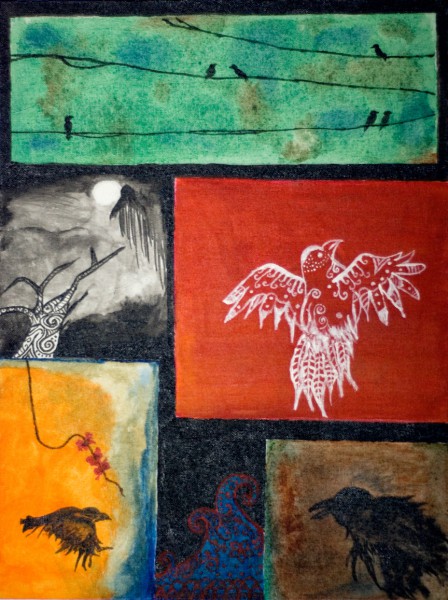The Boy Who Will Cure Everything

The evening before the Chief Minister comes to the village, the Wonderboy wants to be a normal boy. He is tired of being a Wonderboy. He doesn’t want to sit on a wooden chair, legs dangling because he is too little and the chair too high, a garland of marigold flowers hanging from his neck and a red lotus on his right hand. First, he used to hold a real red lotus. He liked that. About a month ago, a devotee gifted him a beautiful rubber lotus that doesn’t dry out in the heat. He misses the smell of fresh, red lotuses. He hates the smell of crushed marigold petals from his garland because the garland of real marigold flowers is changed every two days. He is tired of instructing his devotees to eat this and eat that, and pray to God by facing the east with wet clothes on to heal diseases. That evening, when the devotees leave, he tells his mother that he wants to jump into the cool pool behind his house and swim like he used to six months ago when things changed in his life. He wants to go fishing. Then he wants to go up the hill in search of pomelos.
His mother says he can’t do that because the Chief Minister is coming the next day to meet him. His father locks the door and his mother threatens to break his legs if he leaves. The village headman is on his way to tell him what to ask from the Chief Minister when he comes to ask for the Wonderboy’s blessings. They will go over the questions together. He will have to remember those questions. When the Chief Minister hears those questions, he will listen to him because he is the Wonderboy.
The Wonderboy doesn’t want to meet the Chief Minister. The entire village is waiting to meet the Chief Minister.
***
Six months ago, the Wonderboy has a dream. A man with four arms appears in that dream. One of his hands carries a serrated disk that rests on his index finger. The disk spins nonstop in a scary but fascinating way. He is wearing beautiful yellow clothes and lots of jewelry. He also carries a lotus in his other hand but the Wonderboy is just curious about the things he is carrying in his other two hands: a white conch and a gold mace.
“What do you want?” he asks him.
The man with the four hands says, “I want to give you something.”
“I will take it if you tell me how you scratch your back,” he asks the man.
“Like this,” he scratches his hand, passing the lotus from one of his hands to the other that was holding the conch.
The Wonderboy, who is not yet a wonderboy but just a regular boy, protests, “That’s cheating. I asked how you scratch your back.”
He scratches his back. It makes a loud sound, and the room vibrates. That is when the boy knows that this man is really powerful.
Now that his curiosities are quenched, he stares at the serrated spinning disk and feels sleepy in his sleep. He remembers that he is dreaming. The man wakes him up and says, “You have forgotten, I am here to give you a special power.”
“Okay,” the Wonderboy says, and accepts the power. That’s how he is transformed from a regular boy to a Wonderboy who is able to perform miracles : heal diseases, predict the future, but not narrate the past.
When he wakes up, it is late morning and the sun is overhead. His mother is getting ready to work in the fields of the Village Chief. The Chief has a potbelly and he wears a wife-beater. When it is too hot, he pulls the wife- beater to his chest, airing the skin over his rotund belly and walks around scratching it, scolding his employees for being lazy.
The Chief hires a lot of people to work in his endless rice fields. The Wonderboy doesn’t like him at all. His mother gets a basketful of rice in return, for working in the fields for twelve hours, and if his father works, he earns two baskets. Women are paid less than men. She stores the rice in a plastic drum that was used to store plastic colors. She had collected it when the Chief painted his house red a few springs ago. He didn’t want to give it to her at first, but she begged him because she knew she needed an airtight container to store her rice away from cockroaches.
The Wonderboy tells his mother about the dream and his mother starts to cry. She holds his feet, presses her head against them and asks him to wait until she returns and, because she is screaming so much, she attracts a bunch of curious onlookers.
By noon, he is on a wooden chair with arms, a garland of marigold hanging from his neck and a real lotus on his hand. His father tells him that they are playing God-God since God arrived in his dream. If he plays God-God for a few days, he will get to eat porridge and grapes. The boy doesn’t know how that will happen but he trusts his father. The people dress him in a yellow dhoti like the man in the dream. There are several people from the village who come to meet him. They ask him about the dream, but he says, as instructed by his mother and father, that he can’t speak about it. They ask about the medicine he found in the dream and he says, it will cure every disease but he can’t speak about that, either.
He loves the game. Unlike other days, he doesn’t ask his mother to let him go play in the fields with friends where he plays with a large elephant apple because none of them can afford to buy a real rubber ball to kick around. He enjoys the attention of the people who come to meet him every day. He loves to bless them with his right hand just like the priest in the village who usually behaves rudely with him when he asks for a second spoon of porridge. His father tells him it is because they are lower on the caste rung. They will just receive one spoonful of porridge. He has asked him several times not to go to the local prayer hall and beg for porridge. We will eat well here, even if we don’t have enough milk to make porridge, his father says.
But it is too tempting not to go.
Now, he doesn’t have to go in search of porridge. That afternoon, when the same priest comes with his wife with a large pot of porridge, the Wonderboy is startled. They bow to him. They make an offering of fifty rupees and the pot of porridge. As soon as they leave, the Wonderboy looks around for the pot of porridge. He wants the entire pot for himself. He can’t see his mother. He asks for his father. Even he isn’t around. There is a line of people waiting to meet him but he runs to the kitchen, finds the pot, and starts eating from there. When his mother returns, she is angry. She snatches the pot from him and calls him greedy and slaps him hard. He starts to cry. He is loud and won’t stop. It is so awkward.
“The Lord tried to steal porridge!” a devotee announces.
“Did he also try to steal butter?” another woman asks, joining her hands in respect. “The Lord also has human problems because this is his human incarnation.”
His mother is still angry but she controls herself. She can’t lie in front of God and she confesses, “We don’t have butter. We really can’t afford it.”
“Someone please get a bit of butter for the Lord!” a man instructs another man.
The rest of the people gasp in surprise and awe. They are waiting to touch his feet, offer more food, more fruits; the type of grapes he has only ever seen in movies and sweets that he has only seen in the market but has never been able to afford. An old woman says that only the Mother can hit or scold him. This is God’s human drama. He comes to the earth to get love and affection from a mother. Though the mother is human, the God will forgive her because he has chosen her as his mother. She must have fed a lot of poor people in her previous birth, to have this chance to raise a God, slap a God, snatch the pot of porridge from him; another woman remarks, and starts to weep in happiness.
The Wonderboy is angry. Upset, he runs to the bedroom and locks himself in. He thinks he deserves all the porridge—he has earned it for playing God-God all day. It was very boring. Why should he share it with his brother? Why should he share it with the guests who have come uninvited? His mother pleads.
Finally, she says, she will jump in the well if he doesn’t come out. She will also tie a steel pot around her neck before jumping so that she drowns for sure. He unlatches the door, steps out, howling and crying asking her not to die and hugs her. He throws away the steel pot, the only one, in the house. A devotee picks it up to place it in his altar and pray. The steel pot will bring him wealth and good fortune. All the women and men in the courtyard start to sing hymns about the Lord’s mysterious ways and his Human Drama.
“When you don’t obey me, I feel like killing myself,” she says.
Terrified, the boy cries more.
***
At first, only the locals come for the secret medicine. The Wonderboy climbs the tree in the morning. The tree is in the backyard so he doesn’t have to go far. He chops a bunch and then further chops them into smaller pieces: each of them two inches long. Then he arranges them in groups of four and binds them together with a red thread. The people watch him. They conclude, and spread the news, that the medicine has to be prepared by the God incarnate, otherwise it won’t work.
A man comes from a village that is a bit far away. He asks, will this cure my cancer?
The Wonderboy says it will, because his parents have asked him never to say no. If he believes in it, it will cure cancer. If he wraps it in a cotton cloth with red borders, and wears it around his waist, making sure the chopped wood grazes his skin, it will work. It will cure cancer and diabetes and migraines and infertility because this is what the God has told him. A day later, more people from that village arrive. More people from the neighboring villages arrive. In less than fourteen days, the word spreads to the city and even officers who chase thieves, and teachers who draw government salaries arrive with sick patients. He blesses them all.
The specialty of the Wonderboy is that he doesn’t charge. However, people are free to donate. There is a donation box right in front of his humble abode—a cottage made of bamboo. A man from Dibrugarh, who is fighting many corruption cases associated with his construction company, says that he will donate money for a house and a temple because the Wonderboy cured his mother’s diabetes. He writes a fat cheque. In a day, a politician from far away Dhubri comes for his blessings, and says he will provide all the bricks and cement and iron required to build the house. A few feet away from their house there is a thicket of slim bamboos used to make flutes and hibiscus flowers and other poisonous shrubs that give you rashes. They clear it to construct a new house.
By the end of the month, so many people arrive that the local authorities have to take charge of law and order. They create barricades and employ constables to ensure the people are maintaining the queue. Several unemployed boys from the village set up tea-stalls and betel-nut shops for people standing in the queue for six to seven hours. They tell people about the supernatural powers of the Wonderboy. How on the day of his birthday a massive storm razed the village, blew away every roof of every house, but left his house intact. How they found him playing with a large python one day. How a woman who refused to stop dancing, refused to comb her clothes, refused to stop smearing soil on her body calmed down and fell at his feet asking for forgiveness when she was brought around his energy field.
***
The Wonderboy is growing tired. Every day, he tells his mother that he won’t play God-God anymore. He has eaten enough porridge and sweets. His mother is horrified. His father is dismayed. She threatens to hit him. She is his mother, and that’s why she can hit him, and punish him, and the real God who has four hands will not punish her. Every night, the Wonderboy cries to sleep because he is tired of this game that his parents are making him play. They had promised that it will get over in a few days and now it has been months. He has to stay home and can’t go out at all.
The Wonderboy has a name. His name is Pitlu Deka and if an eleven-year-old boy may have a girlfriend, her name is Purki Das. She is called Purki because when she was an infant she used to fart a lot after breastfeeding. She is eleven now. She doesn’t fart anymore. But the sound she used to make white farting, purk-purk, has continued to be her name of endearment and shame. Her good name, as in the official name, is Indrani. It is a beautiful name. Indrani is the wife of Indra who is the King of all Gods. He is like an administrator but actually he follows the orders of the Big Gods. There are three Big Gods. One of the Big Gods is that God with four hands and a serrated spinning disk who showed our Wonderboy how he scratches his back.
The Wonderboy is tired of being venerated. He wants to play with Purki. He wants Purki to call him “Hey silly, catch me” and chase her across the field. He wants Purki to appear from nowhere and kick his ass and shout “catch me if you can, stupid” and play catch-me-catch-me for hours, running across the dusty lanes of the village. He is over with porridge and fruits and red grapes and black grapes and apples.
He has put on weight. He is now double the size. When he walks fast, he huffs and puffs. Purki likes him. She plays with him and shares her Mango-bite candy and ripe peaches with him because he doesn’t call her Purki, the name she is ashamed of. He calls her Indrani. One day, in school, he had fought one of his friends who called Purki, purki in front of him. He misses her. He misses going to school. He misses chasing her in the field and then rolling on the hay and stealing mangoes and jackfruits and peaches and myrobalan with her. He doesn’t want these foreign fruits anymore. He wants to swim with her in the Tamulidobha River and catch fish together and wince his face eating raw myrobalan without salt, and then run to drink cold water to feel the sweetness in the mouth.
***
Perhaps that’s why, on the day the Chief Minister of the state is supposed to visit, he vanishes. The Chief Minister waits; he is so patient and devoted. He is sweating, though it is not really hot. He is used to air-conditioned rooms. He has come with a fleet of cars and an army of soldiers with modern weapons. The cars have sirens and blinking red lights. He is such a faithful believer of God. The entire village is busy with him, Sir-siring him: “Sir this”, “Sir that.”
The night before, the village headman tutors the Wonderboy to talk about building the road, more funds for the school, more money for the prayer hall. Wonderboy, who is tired and upset that his mother has just threatened to break his legs, nods. He is so overwhelmed. His mind wanders off to the plan he has made with Purki the next day.
He isn’t found anywhere in the village, not even in the shallow Tamulidobha River. They find him with Purki in the deep lake in the middle of the forest where no one goes because it is too dangerous. The water in that lake is green. The forest around is full of witches who cook their dinner on the skulls of unmarried men. The village elders suspect he is in the lake’s bed, fighting snakes, to save the village and the world from disaster because that’s what the Lord is supposed to do according to the ancient scriptures. Expert men in the village dive and bring up the bodies. Men suck their teeth and the women weep in a singsong voice, “He was trying to save us from snakes living in the lake.”
Some others suck their teeth and comment that this tragedy is the sign that the apocalypse would come; that the Wonderboy and Purki must have come here so that no one would find them fishing, swimming. The creel and the fishing rod, are on the bank, just next to the German grass that smells terrible when crushed but is a good antiseptic.
When the men in the village lay down the bodies on the flat stone, the women cry. The lake is still dripping away from their sleeping bodies.
God is dead, the Chief Minister exclaims.
![]()

Aruni Kashyap is a writer and translator. He is the author of the novel The House With a Thousand Stories (Viking, 2013). He has also translated from Assamese and introduced Indian writer Indira Goswami’s last work of fiction, The Bronze Sword of Thengphakhri Tehsildar, for Zubaan Books (2013). He won the Charles Wallace India Trust Scholarship for Creative Writing to the University of Edinburgh in 2009. His short stories, poems, and essays have appeared or forthcoming in The Oxford Anthology of Writings from Northeast, The Kenyon Review, The New York Times, The Guardian UK, the Hindu, Evergreen Review, Karthika Review, Juked, Sin Fronteras Journal, Stonecoast Review, The Atticus Review, and others. He is an Assistant Professor of Creative Writing at the University of Georgia, Athens.


 Ayeda Husain is a longtime journalist (Masters from NYU many a moon ago) who spends her free time writing short stories about Pakistani women, composing and recording meditational music and running a Sufi Center where she teaches Sufi meditation and philosophy.She has lived and worked in Lahore, New York, Vancouver, Dubai and now Oakville, near Toronto, where she is watching her children grow up way too fast.
Ayeda Husain is a longtime journalist (Masters from NYU many a moon ago) who spends her free time writing short stories about Pakistani women, composing and recording meditational music and running a Sufi Center where she teaches Sufi meditation and philosophy.She has lived and worked in Lahore, New York, Vancouver, Dubai and now Oakville, near Toronto, where she is watching her children grow up way too fast.

 Zahida Begum of Sohnipat, Haryana, Hindustan, remembered distinctly her name, even recognized faces as well as anyone could, but sometimes forgot that her husband was dead. Other times, she forgot she ever even had a husband. Last summer, when she began waking up before the sun and the muezzin-and certainly not to pray Fajr-one could not tell if, on any particular day, Zahida had woken up with the memory of a dead or alive husband, or whether there was any memory of him at all.
Zahida Begum of Sohnipat, Haryana, Hindustan, remembered distinctly her name, even recognized faces as well as anyone could, but sometimes forgot that her husband was dead. Other times, she forgot she ever even had a husband. Last summer, when she began waking up before the sun and the muezzin-and certainly not to pray Fajr-one could not tell if, on any particular day, Zahida had woken up with the memory of a dead or alive husband, or whether there was any memory of him at all.






